The Beagle breed is a distinguished and cheerful one with a rich history rooted in England. Originally bred as scent hounds for hunting small game, such as rabbits, their exceptional noses and unwavering determination have earned them a reputation as some of the finest trackers in the canine world. Beagles are renowned for their friendly, inquisitive, and sociable nature, making them ideal companions for families and individuals alike. Whether exploring new trails or enjoying time at home, their loyal and adaptable temperament ensures they bring a sense of joy and liveliness to any environment.
Let’s find out more about the care requirements for each life stage of a Beagle.
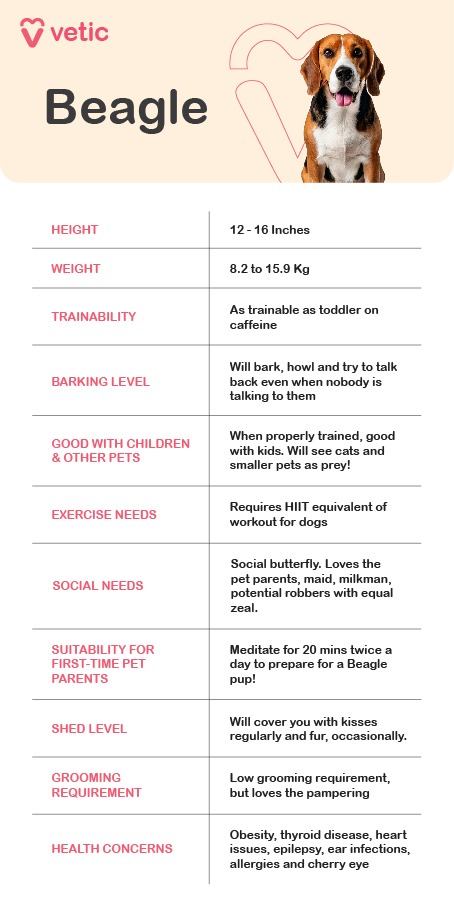
Nutritional Needs and Feeding Options for Beagle Breed Puppies
Nutritional Needs of Your Beagle Pup:
Beagle puppies are small but active, with high energy levels and rapid growth needs. Their diet should focus on providing balanced nutrition for healthy development while preventing excessive weight gain.
- Protein: Include high-quality animal-based proteins such as chicken, turkey, and eggs to support muscle development. Beagles are less prone to purine-related issues than some other breeds, but avoid low-quality or overly processed protein sources.
- Fats: Essential fatty acids, like omega-3 and omega-6, support brain development, a shiny coat, and healthy skin.
- Carbohydrates: Provide energy through complex carbs like rice, oats, or sweet potatoes, which are easy to digest and support their active nature.
- Vitamins and Minerals: Calcium and phosphorus are essential for bone development. Vitamins A, C, and E boost immunity, while iron and zinc contribute to overall health.
Food Options for Your Beagle Puppy:
- Commercial Kibble: Choose high-quality puppy food designed for small breeds, such as Royal Canin Beagle Puppy or Orijen Puppy. These options cater to their nutritional needs and kibble size for smaller mouths.
- Wet Food: Wet food provides hydration and is a good option for picky eaters, but ensure it meets AAFCO standards for puppy nutrition.
- Home-Cooked Meals: Consult a veterinarian to design a balanced diet. Use lean proteins (like chicken), vegetables (like carrots and zucchini), and small portions of grains (like rice).
- Treats: Limit treats to 10% of their daily caloric intake and use them for training purposes. Look for small, low-calorie treats suitable for puppies.
Feeding Frequency and Timing:
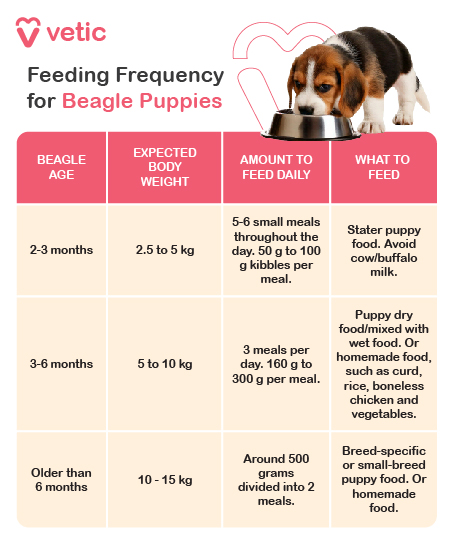
- 6 to 12 Weeks: Feed 4 small meals a day. Puppies have small stomachs and need frequent meals to maintain energy levels.
- 12 to 24 Weeks: Transition to 3 meals a day as their stomach capacity increases.
- 4 to 6 Months: Reduce to 2 meals a day to establish a lifelong feeding routine.
Additional Tips for Beagle Puppies:
- Avoid Overfeeding: Beagles have a tendency to overeat, leading to obesity. Measure their food portions and monitor their weight regularly.
- Fresh Water: Ensure access to clean, fresh water at all times to keep them hydrated.
- Feeding Time: Feed at consistent times each day. Avoid feeding them right before bedtime or vigorous play to prevent digestive issues.
By catering to their specific nutritional needs and maintaining a proper feeding schedule, your Beagle puppy will grow into a healthy and energetic adult.
Grooming Needs and Maintenance of Beagle Breed Puppy
Coat Care:
Beagle puppies have short, dense coats that shed moderately throughout the year.
- Brushing: Use a soft-bristle brush or grooming mitt 2–3 times per week to manage shedding and maintain coat health.
- Bathing: Bathe your puppy once every 1–2 months with a gentle, vet-recommended puppy shampoo. Avoid over-bathing to preserve natural skin oils.
- Skin Checks: During grooming, check for redness, rashes, or signs of fleas and ticks.
Ear Care:
- Clean their ears weekly with a vet-approved ear cleaner to prevent wax buildup and infections.
- Watch for signs of ear discomfort, such as scratching or foul odors.
Nail Trimming:
- Trim nails every 3–4 weeks using puppy nail clippers or a nail grinder. Overgrown nails can cause pain and difficulty walking.
Dental Hygiene:
- Begin brushing your puppy’s teeth 2–3 times weekly with dog-safe toothpaste and a soft toothbrush.
- Introduce dental chews or toys to promote oral health and reduce tartar buildup.
By providing consistent preventive care, a proper vaccination schedule, and regular grooming, your Beagle puppy can thrive and grow into a happy, healthy adult dog.
Preventive Care and Vaccine Schedule for Beagle Puppies
Vaccination Guidelines for Beagle Puppies
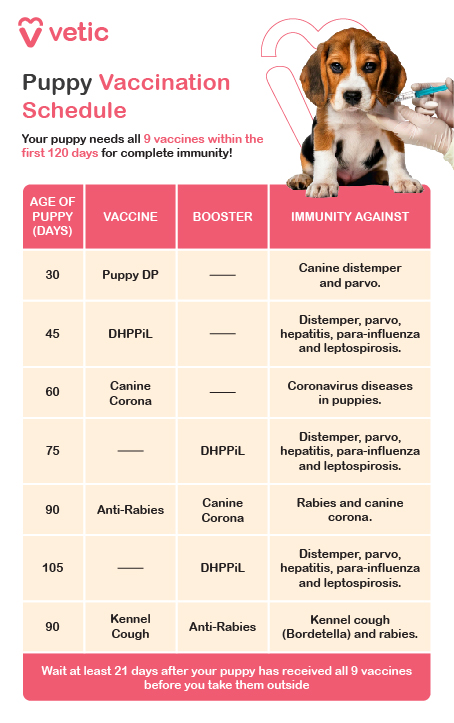
Beagle puppies require a well-planned vaccination schedule to safeguard them from common diseases. Their social and energetic nature makes vaccinations essential for a healthy start in life.
- 6–8 Weeks: Initial vaccines for Distemper, Parvovirus, and Bordetella.
- 10–12 Weeks: Booster shots for Distemper, Parvovirus, Leptospirosis, Hepatitis, and Parainfluenza. Rabies vaccination may also be needed depending on local laws.
- 14–16 Weeks: Final round of core vaccinations, including Rabies if not already administered.
Deworming Beagle Puppy and Keeping Ticks, Flea Away
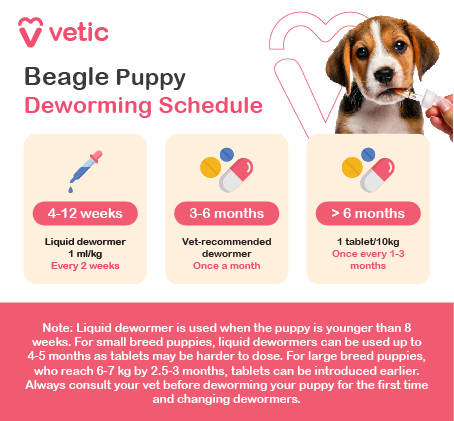
- Flea and Tick Prevention: Begin approved flea and tick treatments (oral or topical) at 8 weeks of age to prevent infestations.
- Heartworm Prevention: Start monthly heartworm preventatives by 12 weeks, especially in areas where heartworm is prevalent.
- Routine Vet Visits: Schedule veterinary check-ups every 3–4 weeks during the first 6 months to monitor growth, administer vaccinations, and discuss any health concerns.
Health Risks and Warning Signs
Common Health Concerns for Beagle Breed Puppies
While Beagle puppies are typically robust, they are predisposed to certain conditions:
- Obesity: Beagles can overeat, so portion control and regular exercise are crucial.
- Ear Infections: Their floppy ears trap moisture and debris, increasing the risk of infections. Regular ear cleaning is essential.
- Allergies: Beagles can develop skin sensitivities. Monitor for itching, redness, or hair loss.
- Joint Problems: Beagles may experience early joint issues. Watch for discomfort during movement or swelling.
Signs to Monitor:
- Unusual lethargy or reduced responsiveness
- Difficulty urinating or changes in bathroom habits
- Excessive scratching, redness, or skin irritation
- Vomiting, diarrhea, or a sudden change in appetite
- Lameness or reluctance to move
Prompt veterinary care for these symptoms can help prevent more serious health complications.
Activities, Exercise, Training and Behavioural Training for Beagle Puppies
Physical Activities for Your Beagle Puppy
Beagle puppies are lively, curious, and energetic. Regular physical activities help channel their playful energy and support healthy development.
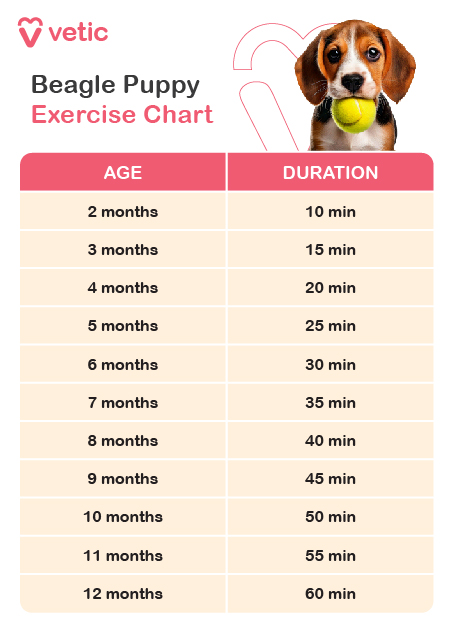
Playtime
- Engage in short, interactive games like fetch, tug-of-war, or hide-and-seek to provide exercise and mental stimulation.
- Beagles love sniffing and exploring, so incorporate scent-based games like hiding treats.
Walks
- Start with brief walks lasting 10–15 minutes, gradually increasing the exercise duration as your puppy grows.
- Avoid overexertion, as their small breed size makes them prone to fatigue.
Indoor Activities
- Beagles can thrive indoors with games like chasing balls or playing with interactive toys.
- Provide a safe, enclosed space for free play to burn off energy.
Training Your Beagle Breed Puppy
Beagles are intelligent but can be stubborn, so early and consistent training is essential.
House Training
- Use crate training and frequent potty breaks, particularly after meals and naps, to establish a routine.
- Reward desired behaviors with treats and praise for faster learning.
Basic Commands
- Start with simple commands like sit, stay, and come. Positive reinforcement, such as treats and affection, works best for Beagles.
- Be consistent and patient, as Beagles can be easily distracted by scents.
Leash Training
- Teach loose-leash walking early to prevent pulling, as Beagles have a strong sense of smell and may wander off.
Socialization
- Expose your puppy to various people, pets, and environments. Socialization helps Beagles grow into confident and friendly adults.
Mental Stimulation Needs for Beagle Puppies
Beagles are natural explorers and need mental challenges to stay happy.
Puzzle Toys
- Provide toys that encourage problem-solving, such as treat-dispensing puzzles, seeker toys or interactive feeders.
- Rotate toys frequently to maintain interest.
Scent Games
- Beagles love using their noses. Create scent trails or hide treats for them to find.
- These games tap into their hunting instincts and provide hours of fun.
Training Games
- Incorporate games like hide-and-seek or teaching new tricks to keep their minds sharp.
Addressing Behavior Problems in Beagle Puppies
Common Issues
- Chewing: Like most puppies, Beagles may chew on household items while teething.
- Barking: Beagles are vocal and may bark out of boredom or for attention.
- Digging: Their inquisitive nature can lead to digging, especially in gardens.
- Pulling on Leash: Beagles often pull while walking due to their strong sense of smell.
Solutions
- Chewing: Redirect to safe chew toys and reward appropriate chewing. Rotate toys to keep them engaging.
- Barking: Address the cause of barking and train using the “quiet” command paired with rewards.
- Digging: Provide a designated digging area and encourage its use with treats or toys.
- Pulling on Leash: Use a no-pull harness and practice focused leash training.
Managing Separation Anxiety in Beagle Puppies
Beagles are social dogs and can develop separation anxiety if left alone for long periods.
- Gradually increase the time your puppy spends alone to help them adjust.
- Leave engaging toys or puzzle feeders to keep them entertained in your absence.
- Maintain calm departures and arrivals to avoid reinforcing anxiety.
The Guide to Your Junior Beagle’s Health and Wellness
Complete Nutrition Guide for Junior Beagles (6 to 18 Months)
Junior Beagles are highly energetic and growing rapidly during this stage, requiring a balanced diet to support their development, energy needs, and overall health.
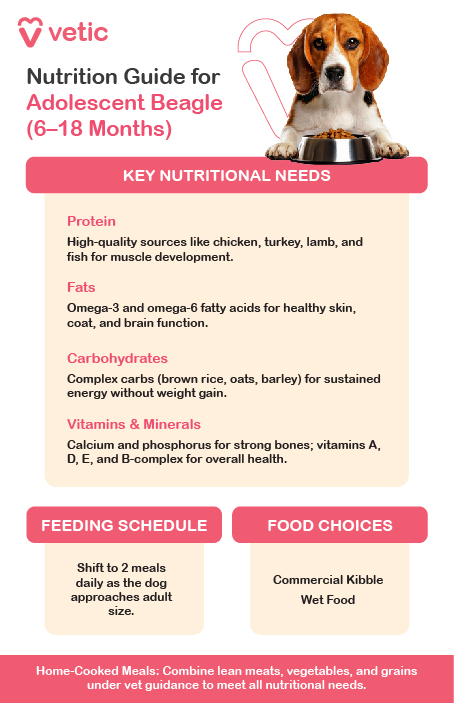
Essential Nutritional Needs
- Protein: High-quality animal proteins such as chicken, turkey, lamb, or fish are vital for muscle development and sustained energy.
- Fats: Omega-3 and omega-6 fatty acids promote healthy skin, a shiny coat, and optimal brain function.
- Carbohydrates: Complex carbohydrates like sweet potatoes, oats, or barley provide steady energy without risking unnecessary weight gain.
- Vitamins and Minerals:
- Calcium and Phosphorus: Essential for strong bones and teeth as your Beagle grows.
- Vitamin B Complex: Aids in energy production and supports the nervous system.
Recommended Food Options
- Commercial Dry Food:
Choose high-quality kibble specifically designed for junior or medium-breed dogs. Look for brands like Acana Junior Puppy formula. You can also check out Junior Puppy Food by Arden Grange made from human-grade chicken. - Wet Food:
Occasionally mix wet food with dry kibble for variety and hydration. Ensure it’s formulated for junior dogs and provides balanced nutrition. - Home-Cooked Meals:
Prepare meals with lean proteins (chicken or fish), nutrient-dense vegetables (carrots, zucchini), and grains like rice or oats. Always consult your veterinarian for a tailored recipe.
Feeding Guidelines
- 3 to 6 months: Offer 3 meals a day to meet their high energy and nutritional needs.
- Older than 6 months: Gradually transition to 2 meals daily as your Beagle approaches adulthood.
Additional Tips:
- Measure portions based on your Beagle’s size, age, and activity level to avoid overfeeding.
- Provide fresh, clean water at all times, especially after meals or exercise.
- Avoid free-feeding to prevent obesity and encourage a healthy eating routine.
By following these nutritional guidelines, your junior Beagle will have the foundation for a healthy, active, and vibrant life.
Grooming Necessities and Frequency for Junior Beagles (6 to 18 Months)
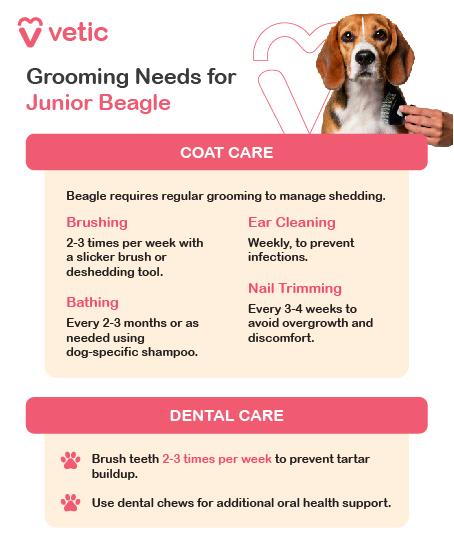
Coat Care
Beagles have a short, dense coat that sheds moderately year-round and requires regular maintenance.
- Brushing: Use a soft bristle brush or rubber grooming mitt 1–2 times a week to remove loose hair, distribute natural oils, and keep the coat shiny.
- Bathing: Bathe every 2–3 months or as needed using a mild, hypoallergenic dog shampoo. Avoid over-bathing to prevent stripping natural oils from their coat.
Ear Cleaning
Beagles’ floppy ears can trap moisture and debris, increasing the risk of infections.
- Clean ears weekly with a vet-approved ear-cleaning solution to remove wax buildup and prevent infections.
Nail Trimming
Trim nails every 3–4 weeks or when you hear them clicking on hard surfaces.
- Overgrown nails can lead to discomfort or gait issues. If unsure, consult a groomer or vet for safe trimming.
Dental Care
- Brushing: Brush your Beagle’s teeth 2–3 times a week with a dog-specific toothbrush and toothpaste to prevent tartar buildup and gum disease.
- Chews and Toys: Offer dental chews or toys for additional oral hygiene support.
Special Considerations for Beagles
- Shedding: Beagles shed moderately; regular brushing helps reduce loose hair.
- Skin and Coat Health: Watch for dryness, redness, or itching. Use grooming products formulated for sensitive skin if needed.
- Scavenging: Beagles are prone to scavenging, so keep your grooming supplies and any harmful substances out of reach.
Preventive Care and Vaccines for Junior Beagles (6 to 18 Months)
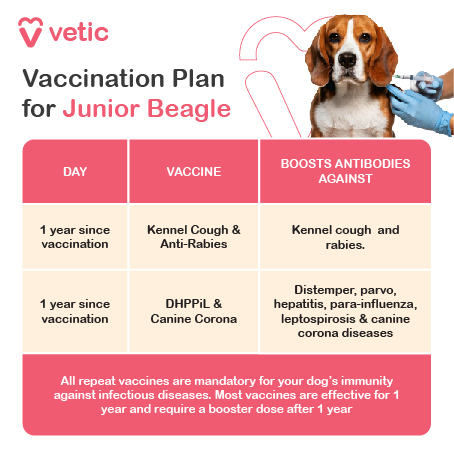
Vaccination Needs for Junior Beagles
By the time your Beagle reaches junior age (6 to 18 months), core vaccinations should already be completed, but booster shots and additional vaccines may be necessary based on regional risks and your vet’s advice.
Core Vaccines:
- 6–12 Months: Administer booster shots for DHPPiL (Distemper, Hepatitis, Parvovirus, Parainfluenza, and Leptospirosis), Rabies, and Kennel Cough if due.
- Annual Boosters: Depending on your vet’s recommendation, some vaccines, like Rabies and DHPPiL, may require yearly administration.
Parasite Prevention in the Beagle Breed
- Flea and Tick Control: Apply monthly preventatives to safeguard your Beagle from infestations and diseases such as tick fever.
- Heartworm Prevention: Continue with monthly heartworm preventatives, especially in areas where heartworm is prevalent.
- Deworming: Follow your vet’s schedule for regular deworming to prevent intestinal parasites.
Routine Vet Check-ups
Schedule veterinary visits every 6 months to:
- Monitor weight, growth, and body condition.
- Address any noticeable changes in behavior, appetite, or coat condition.
- Detect early signs of potential health issues.
Health Risks and What to Watch Out For in Beagle Juniors
Common Health Risks in Junior Beagles
- Obesity:
Beagles are prone to overeating.- Maintain a balanced diet and ensure regular exercise to prevent weight gain.
- Monitor their body condition score regularly.
- Ear Infections:
Beagles have long, floppy ears that can trap moisture, making them susceptible to infections.- Clean their ears weekly and watch for signs like head shaking, redness, or odor.
- Allergies:
Environmental or food allergies can cause itching, redness, or scabs.- Identify and eliminate allergens with your vet’s guidance.
- Gastrointestinal Issues:
Beagles are notorious for scavenging and consuming inappropriate items.- Monitor for vomiting, diarrhea, or abdominal discomfort.
- Hip Dysplasia:
Though less common at this age, keep an eye out for signs like stiffness or difficulty moving, especially in active Beagles.
Signs to Watch For in The Beagle Breed
- Sudden or unexplained weight gain or loss.
- Persistent scratching, licking, or skin irritation.
- Changes in energy levels, appetite, or drinking habits.
- Vomiting, diarrhea, or gastrointestinal discomfort.
- Unusual odors from the ears or mouth.
When to Contact Your Veterinarian
Seek veterinary attention immediately if you notice:
- Difficulty or pain while urinating.
- Unexplained lethargy or reluctance to play.
- Limping, whining, or signs of pain.
- Persistent vomiting or diarrhea lasting more than 24 hours.
By staying vigilant and maintaining a proactive care routine, you can ensure your junior Beagle remains healthy, happy, and ready to explore their world!
Activities, Exercise, and Training for Junior Beagles (6 to 18 Months)
Physical Activities for Junior Beagles
Beagles are energetic and curious dogs that require regular exercise to keep them healthy and mentally stimulated.
- Daily Walks: Aim for 30–45 minutes of walks, 1–2 times a day. Beagles love sniffing, so allow time for nose work during walks.
- Playtime: Engage in games like fetch or tug-of-war to burn off energy and strengthen your bond.
- Scent-Based Activities: Beagles excel at scent work. Hide treats or toys around your home for your Beagle to find.
Training Junior Beagles
Beagles are intelligent but can be stubborn, making consistent and positive training essential.
- Basic Commands: Reinforce commands like sit, stay, come, and leave it.
- Leash Training: Beagles love to follow scents, so teach loose-leash walking to prevent pulling.
- Impulse Control: Practice exercises like waiting for a command before eating or crossing thresholds.
Mental Stimulation for Junior Beagles
Beagles thrive on mental challenges, so keeping their minds engaged is just as important as physical exercise.
- Puzzle Toys: Use treat-dispensing toys to challenge your Beagle’s problem-solving skills.
- New Tricks: Teach your dog fun tricks like paw shakes or spin to stimulate their brain.
- Interactive Games: Play hide-and-seek with treats or toys to tap into their natural tracking instincts.
Behavior Problems and Solutions for Junior Beagle
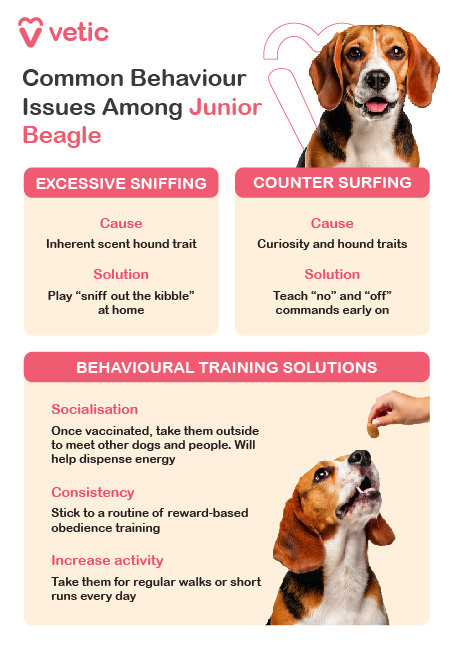
While Beagles are generally friendly and adaptable, some behaviors may require attention:
- Excessive Sniffing: Beagles’ strong scent drive can make walks slow. Use a “let’s go” command to redirect them when necessary.
- Counter Surfing: Beagles are food-motivated and may attempt to steal food. Keep counters clear and train the “off” command.
- Chewing: Provide plenty of chew toys to satisfy their teething or boredom-related chewing.
Socialization of Junior Beagle
Expose your Beagle to different environments, people, and animals. Regular trips to parks or playdates with other dogs help maintain their sociability.
By ensuring your Junior Beagle gets the right balance of exercise, training, and mental stimulation, you’ll nurture their natural curiosity and playful nature while addressing potential challenges.
The Complete Guide to Managing Adult Beagle Health and Wellness
Adult Beagle: Complete Nutrition and Feeding Guide for The Beagle Breed
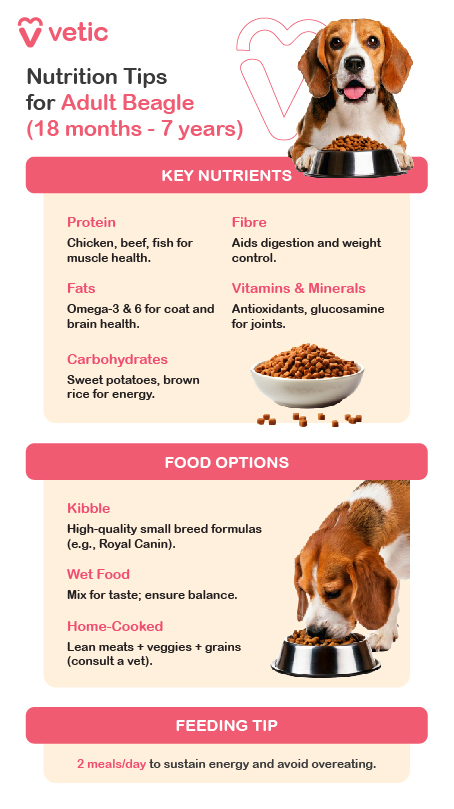
Adult Beagles, typically between 2 and 7 years old, require a well-rounded diet to keep them healthy, active, and at an ideal weight. Given their energetic nature and tendency for weight gain, maintaining the right nutritional balance is essential for their well-being.
Nutritional Needs of Adult Beagles
- Protein: Focus on high-quality, lean proteins like chicken, turkey, and fish to support muscle health and overall vitality. Be mindful of their calorie intake to avoid excessive weight gain.
- Fats: Include healthy fats such as omega-3 and omega-6 fatty acids, which promote a shiny coat and healthy skin while supporting brain function.
- Carbohydrates: Complex carbohydrates like sweet potatoes, brown rice, and oats provide steady energy throughout the day, helping to maintain a healthy weight.
- Fibre: Dietary fibre from vegetables and grains supports healthy digestion and aids in weight management.
- Vitamins and Minerals: Ensure the diet includes a mix of vitamins A, C, and E for immune health, as well as calcium and phosphorus for strong bones and joints.
Food Options for Adult Beagles
- Commercial Kibble: Choose high-quality, adult-specific dog food that includes balanced nutrition without excessive fillers. Brands like Royal Canin offer complete food suited for Beagles.
- Wet Food: Wet food can offer added moisture and variety. However, ensure it is nutritionally balanced and does not contain unnecessary additives or fillers.
- Home-Cooked Meals: If you prefer to prepare food at home, lean meats, healthy vegetables (such as carrots, peas, or zucchini), and whole grains like brown rice are excellent options. Avoid foods that may contribute to obesity, such as fatty meats. Always check with your vet to ensure the diet meets your Beagle’s specific nutritional needs.
Feeding Frequency and Timing for Adult Beagle
- 2 to 7 Years: Feed your Beagle two meals a day to regulate their energy levels and prevent overeating.
- Regular Feeding Schedule: Stick to consistent meal times and offer fresh water at all times to keep your Beagle hydrated.
Beagles are prone to overeating and eating too quickly, which can lead to obesity or digestive issues. To prevent this, portion their meals and avoid free-feeding.
By providing a balanced diet that addresses your Beagle’s unique health needs, you can ensure they stay energetic, healthy, and at their best throughout their adult years.
Grooming Essentials and Frequency for The Beagle Breed Adults
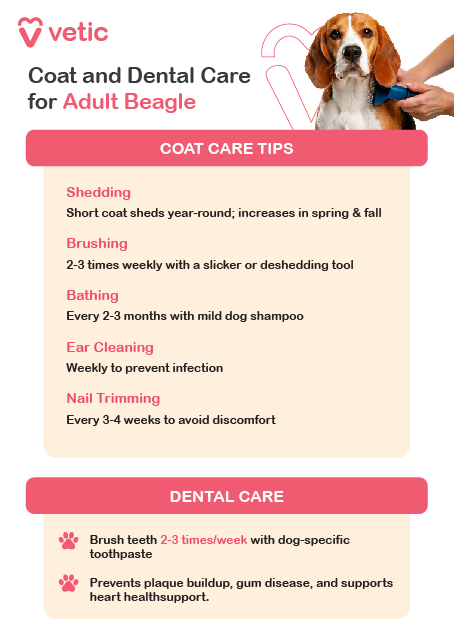
Coat Care
Beagles have a short, dense coat that sheds moderately throughout the year. Regular grooming helps to manage shedding and maintain a healthy, clean coat.
- Brushing: Brush your Beagle’s coat 2-3 times a week with a slicker brush or rubber grooming mitt to remove loose hairs and prevent matting.
- Bathing: Bathe your Beagle every 2-3 months or as needed, using a gentle dog shampoo to manage shedding and avoid drying out their skin.
- Ear Cleaning: Clean your Beagle’s ears weekly using a vet-approved ear cleaner to prevent ear infections, especially after outdoor activities or swimming.
- Nail Trimming: Trim your Beagle’s nails every 3-4 weeks to keep them comfortable and prevent overgrowth, which could lead to discomfort or difficulty walking.
Dental Care
- Teeth Brushing: Brush your Beagle’s teeth 2-3 times a week using dog-specific toothpaste to reduce plaque buildup and promote good oral hygiene.
- Dental Chews: Provide dental chews or toys to supplement brushing and support your Beagle’s oral health.
Preventive Care and Vaccines for Adult Beagles
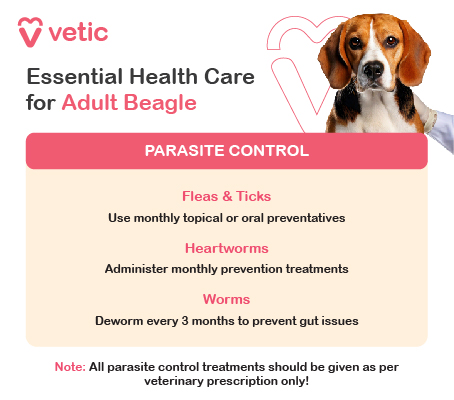
Vaccinations for adult Beagles
By the time Beagles reach adulthood (2–7 years), they should have completed their core vaccination series. However, it’s important to keep up with booster shots and consider additional vaccines based on their lifestyle and environment:
- Annual Boosters: Beagles will need regular boosters for core vaccines, including Distemper, Parvovirus, and Rabies. Your vet will provide guidance on the appropriate schedule based on your dog’s health and exposure risks.
- Optional Vaccines: Depending on your location and activities, optional vaccines such as Bordetella (Kennel Cough), and Canine Corona may be necessary to protect your Beagle from regional risks.
Parasite Control for Adult Beagle
- Flea and Tick Prevention: Protect your Beagle from fleas and ticks by using monthly topical or oral preventatives.
- Heartworm Prevention: Continue administering monthly heartworm preventatives to protect against these life-threatening parasites.
Regular Vet Check-ups
- Annual Vet Visits: Regular veterinary check-ups are essential to monitor your Beagle’s health, weight, and dental condition.
- Diagnostic Testing: Periodic blood panels and other tests may be recommended to catch any early signs of health issues, ensuring that your Beagle stays healthy well into their later years.
Common Health Risks for Adult Beagles and How to Manage Them
Adult Beagles are generally healthy dogs, but they are prone to certain health conditions. Regular monitoring and preventive care are essential to help minimize risks:
- Obesity: Beagles have a tendency to gain weight, which can lead to joint problems, diabetes, and heart disease. Monitor their diet and exercise routine to maintain a healthy weight.
- Ear Infections: Beagles’ floppy ears can trap moisture and debris, leading to infections. Regular cleaning and checking for signs of infection (redness, odor, or discharge) can help prevent issues.
- Hip Dysplasia: Though more common in larger breeds, Beagles can also suffer from hip dysplasia. Keep an eye out for signs of discomfort, limping, or difficulty moving.
- Intervertebral Disc Disease (IVDD): IVDD affects the spine, and it can cause pain or mobility issues. Maintain a healthy weight and avoid excessive jumping or rough play to reduce the risk.
Signs to Watch For in Beagle Adults
- Excessive Thirst or Urination: Could indicate kidney or urinary tract issues.
- Lethargy or Decreased Activity Levels: A drop in energy levels may be a sign of underlying health problems.
- Changes in Appetite or Weight: Unexplained weight loss or gain may require a vet evaluation.
- Skin Issues: Watch for excessive scratching, hair loss, or skin irritation, which may indicate allergies or infection.
- Ear Problems: Persistent ear scratching, head shaking, or foul odor from the ears may point to an ear infection.
If you notice any of these symptoms, it’s important to consult your veterinarian for an evaluation and prompt treatment. Regular veterinary visits and preventive care will help ensure your Beagle stays healthy and happy as they navigate their adult years.
Activities, Exercise, and Training for Adult Beagles
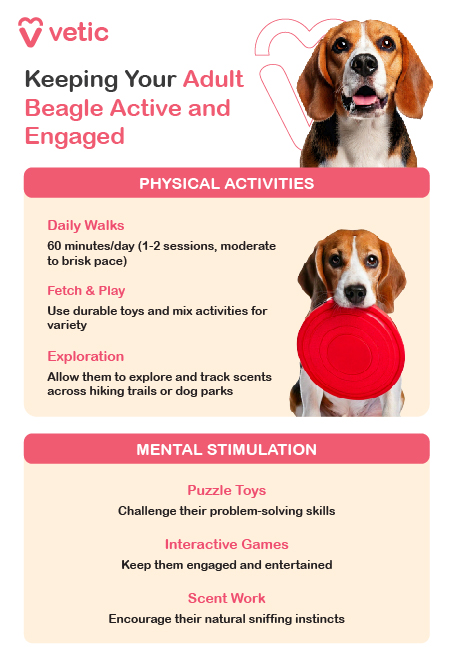
Physical Activities
Beagles are lively, energetic dogs that thrive on regular exercise. Their natural hunting instincts make them highly active, so it’s important to provide physical outlets to keep them fit and mentally engaged:
- Daily Walks: Beagles require at least 60 minutes of exercise daily, divided into one or two sessions. Aim for brisk walks to help them burn energy and keep them in shape.
- Playtime and Fetch: Beagles love interactive play, especially fetch. This is a fun way to tire them out while also bonding. Use durable toys to ensure they last and keep your Beagle engaged by changing up the game.
- Exploration: Beagles enjoy sniffing around, so let them explore new environments or trails. Their excellent sense of smell makes them natural trackers, so exploring open spaces or hiking trails is a great exercise for them.
Training
Training is an ongoing process for Beagles, even in adulthood, to reinforce good behavior and prevent any unwanted habits:
- Advanced Commands: Continue building on basic commands, such as “stay,” “leave it,” and recall. Beagles are intelligent but can be independent, so consistent practice is key.
- Obedience and Trick Training: Engage in obedience training classes or teach your Beagle fun tricks to stimulate their mind and maintain focus.
- Socialization: Beagles should be exposed to various environments, people, and other animals to ensure they remain well-adjusted and confident in new situations.
Mental Stimulation for Adult Beagles
Mental exercise is just as important as physical activity to keep your Beagle sharp and prevent boredom:
- Interactive Games: Provide puzzle toys, scent work, and games that encourage problem-solving. Beagles, with their natural scenting abilities, will enjoy these challenges.
- Training Sessions: Incorporate training into your Beagle’s routine to offer mental stimulation. Regular learning will prevent boredom and reinforce positive behaviors.
Behaviour Problems in Adult Beagles and Solutions
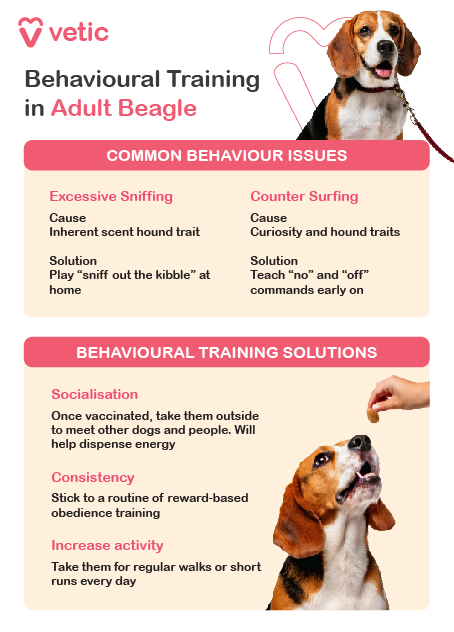
Common Behaviour Issues
Beagles are generally well-mannered, but some behavior issues may arise, especially as they mature:
- Chewing: Beagles may chew if they’re bored or anxious. Ensure they have plenty of appropriate chew toys, and engage in regular play to redirect their attention.
- Howling and Barking: As hounds, Beagles have a natural instinct to vocalize. If barking or howling becomes excessive, positive reinforcement training can help reduce this behavior.
- Pulling on the Leash: Beagles are scent-driven and may pull on the leash during walks. Using a no-pull harness can help reduce tugging and make walks more enjoyable.
Behavioural Training Solutions
Handling behavioral issues in Beagles requires patience, consistency, and positive reinforcement:
- Positive Reinforcement: Reward good behavior with treats, praise, or play. This encourages your Beagle to repeat positive actions. Avoid using harsh methods, as they can lead to anxiety or fear-based behaviors.
- Routine and Consistency: Be consistent with feeding, exercise, and training routines to help your Beagle understand expectations and feel secure.
- Redirecting Behavior: If your Beagle engages in unwanted behavior, redirect their attention to something more appropriate, like a chew toy or a different command they know.
Managing Separation Anxiety in Adult Beagles
Beagles are social dogs and can be prone to separation anxiety if left alone for long periods. Here are some strategies to manage it:
- Gradual Separation: Start by gradually increasing the time you spend away from your Beagle. This helps them adjust to being alone without causing stress.
- Enrichment: Offer puzzle toys, treat-dispensing toys, or a favorite blanket to keep them occupied while you’re away.
- Comfortable Safe Space: Create a comfortable space where your Beagle feels secure when you’re gone. This will help reduce anxiety and ensure they stay calm.
By providing regular exercise, consistent training, and mental stimulation, you can ensure your adult Beagle remains happy, well-behaved, and in great shape throughout their adult years!
Complete Care Guide for The Beagle Breed Seniors
Senior Beagle: Complete Nutrition and Feeding Guide
As Beagles enter their senior years (typically around 9 years and older), they undergo physiological changes that necessitate dietary and lifestyle adjustments. A tailored diet can support their aging bodies, promote mobility, and help manage their weight.
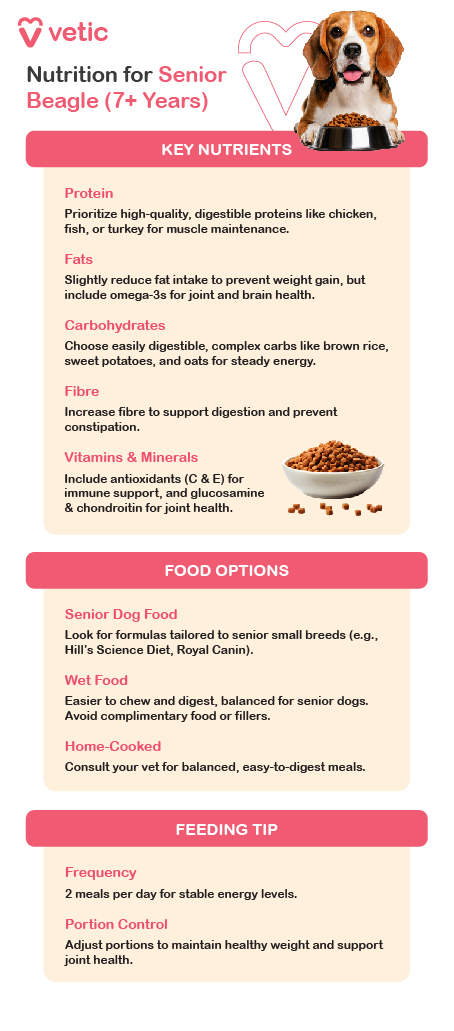
Nutritional Needs for Senior Beagles
- Protein: Provide high-quality, easily digestible proteins to maintain muscle mass and overall health. Opt for sources like chicken, turkey, lamb, or fish.
- Fats: Reduce fat intake slightly to prevent weight gain, but maintain omega-3 fatty acids for joint health and cognitive support.
- Carbohydrates: Offer easily digestible options like sweet potatoes, brown rice, or oats for steady energy without taxing their digestive system.
- Fiber: Increase dietary fiber to aid digestion and prevent constipation, which is more common in older Beagles.
- Vitamins and Minerals:
- Antioxidants like vitamins C and E to boost immune health.
- Glucosamine and chondroitin supplements to support joint health and alleviate discomfort.
Recommended Food Options for Senior Beagles
- Senior Dog Food: Look for high-quality senior dog food formulated for small to medium breeds. Brands like Orijen offer excellent food options for older dogs.
- Wet Food: Wet food can be gentler on aging teeth and easier to digest. Ensure it’s nutritionally balanced for senior dogs.
- Home-Cooked Meals: If you prefer home-cooked meals, consult your veterinarian to ensure the right balance of proteins, vegetables, and grains, avoiding ingredients harmful to dogs.
Feeding Guidelines for Senior Beagles
- Two Meals Daily: Continue feeding two evenly spaced meals to maintain consistent energy levels and prevent blood sugar fluctuations.
- Portion Control: Adjust portion sizes based on your Beagle’s weight, age, and activity level to avoid obesity, which can worsen joint issues and other age-related conditions.
- Hydration: Ensure fresh, clean water is always available, as senior dogs may need to drink more to stay hydrated.
By adapting your senior Beagle’s diet to meet their specific needs, you can help them stay healthy, active, and comfortable throughout their golden years!
Grooming Necessities and Frequency for Senior Beagles
As Beagles age (9 years and older), their grooming needs may change. Regular grooming is essential to maintain their skin, coat, and overall health.
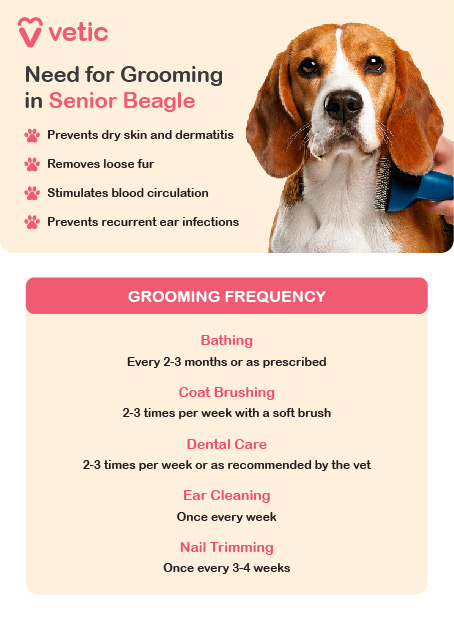
Coat Care
- Thinning or Graying Fur: Senior Beagles may develop a thinner or grayer coat. Routine grooming helps keep their coat and skin healthy.
- Brushing: Brush your Beagle 2-3 times a week with a soft-bristle or rubber grooming brush to remove loose fur and stimulate circulation.
- Bathing: Bathe your Beagle every 2-3 months or as needed. Use a gentle, moisturizing dog shampoo to prevent dry or itchy skin, which is common in older dogs.
- Ear Cleaning: Clean their ears weekly, especially if they are prone to wax build-up or have been outdoors often. This helps prevent ear infections, which are more common in senior Beagles.
- Nail Trimming: Trim your Beagle’s nails every 3-4 weeks or as needed. Since senior Beagles may be less active, their nails may not naturally wear down as much.
Dental Care
- Oral Health: Dental health becomes even more important as Beagles age. Brush their teeth 2-3 times a week using a dog-friendly toothpaste to prevent gum disease and tooth loss.
- Alternatives: If brushing is challenging, use dental chews, water additives, or vet-approved dental treatments to maintain their oral hygiene.
By staying consistent with grooming, you can ensure your senior Beagle stays comfortable, healthy, and happy in their golden years!
Preventive Care and Vaccination Schedule for Senior Beagles
As your Beagle enters their senior years (typically 9+ years), maintaining a regular healthcare routine becomes vital to ensure they remain healthy and comfortable.
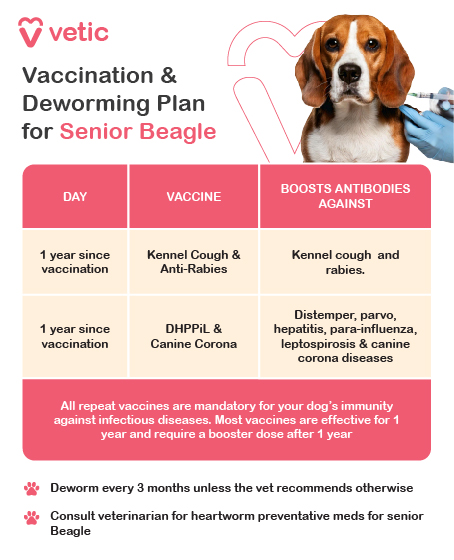
Vaccinations for Older Beagles
- Core Vaccines: Continue with core vaccinations, including Rabies, Distemper, and Parvovirus. Your veterinarian may adjust the schedule based on your Beagle’s overall health and lifestyle.
- Annual Boosters: While annual boosters are common, the frequency may be altered for senior Beagles to account for their changing health needs. Discuss with your vet whether titers (blood tests to measure immunity) are an option.
- Optional Vaccines: If your Beagle’s lifestyle or exposure risks require it, consider additional vaccines such as Bordetella (kennel cough) or Canine Corona, especially if they frequently visit high-risk areas.
Parasite Control for Senior Beagles
- Flea and Tick Prevention: Keep up with regular flea and tick prevention using products safe and effective for senior dogs.
- Heartworm Prevention: Monthly heartworm prevention remains critical, particularly if your Beagle enjoys outdoor adventures. Stick to the prescribed schedule to protect against this life-threatening parasite.
Regular Vet Check-Ups for Senior Beagles
- Bi-Annual Vet Visits: Senior Beagles benefit from bi-annual vet visits. These check-ups help monitor their health, identify age-related conditions early, and manage any emerging concerns.
- Diagnostic Testing: Your vet may recommend routine tests such as blood work, urinalysis, or X-rays to screen for issues like arthritis, kidney disease, or heart conditions.
Health Risks for Senior Beagles and What to Watch For
Senior Beagles are more prone to certain health issues. Early detection is key to effective management.
Common Health Concerns in Senior Beagles
- Arthritis: Signs include stiffness, limping, or difficulty moving. Support their mobility with joint supplements, weight management, and vet-prescribed treatments.
- Obesity: Lower activity levels can lead to weight gain. Adjust their diet and exercise routine as needed to prevent or manage obesity.
- Hypothyroidism: Look for symptoms of hypothyroidism like lethargy, weight gain, and skin problems. Regular tests can detect and treat this condition.
- Heart Disease: Symptoms may include coughing, fatigue, or difficulty breathing. Regular check-ups can aid in early diagnosis and treatment.
- Cancer: Watch for lumps, bumps, or unusual changes in behavior or appetite. Early detection of cancer in dogs significantly improves treatment outcomes.
- Cognitive Decline (Canine Cognitive Dysfunction): Signs include confusion, restlessness, or altered sleep patterns. Mental stimulation and veterinary advice can help manage this condition.
Signs to Watch For:
- Stiffness or difficulty moving
- Sudden weight changes (gain or loss)
- Persistent coughing or breathing issues
- Appetite or water intake changes
- New or unusual lumps on the body
- Behavioral changes such as confusion or anxiety
If you notice any of these symptoms, consult your veterinarian promptly for a thorough evaluation and treatment plan. By staying proactive, you can help your senior Beagle enjoy a comfortable and healthy life in their golden years!
Activities, Exercise, and Training for Senior Beagles
Senior Beagles (typically 9 years and older) may have less energy than when they were younger, but staying active is essential for maintaining their mobility, managing weight, and keeping their minds sharp.
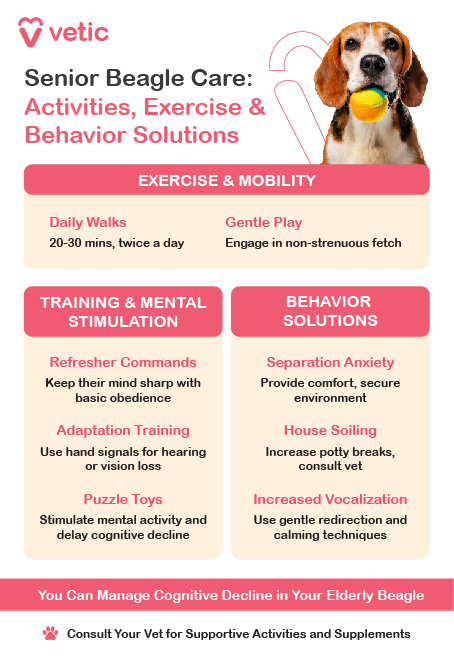
Physical Activities
- Daily Walks: Continue regular walks, but adjust the duration and pace to your Beagle’s energy levels. Aim for 15-20 minutes per session, twice a day, and watch for signs of fatigue or discomfort.
- Gentle Play: Engage in slower, less strenuous games like a modified fetch or nose work activities. Avoid high-impact activities that may strain aging joints.
Training for Elderly Beagles
Training remains important to keep your senior Beagle mentally engaged and well-behaved.
- Refresher Commands: Regularly practice basic commands like “sit,” “stay,” and “come” to reinforce good behavior and provide mental stimulation.
- Adaptation Training: If your Beagle is experiencing sensory decline (e.g., hearing or vision loss), incorporate hand signals or touch-based cues to make training more effective.
Mental Stimulation
Keep your Beagle’s mind sharp with age-appropriate games and activities.
- Puzzle Toys: Use senior-friendly puzzle toys that challenge them without causing frustration.
- Interactive Toys: Provide toys that encourage problem-solving or interaction, which can help delay cognitive decline and reduce boredom.
Behavioral Changes in Senior Beagles and Solutions
As Beagles age, you may notice behavioral changes due to aging or health issues. Addressing these early can improve their quality of life.
Common Behavior Issues
- Separation Anxiety: Older Beagles may become more dependent on their owners and suffer from anxiety when left alone. Create a secure and calming environment and consider anti-anxiety products or treatments if needed.
- House Soiling: This can occur due to incontinence or cognitive decline. Provide more frequent potty breaks and consult your vet for solutions.
- Increased Vocalization: Cognitive changes may lead to excessive barking or whining. Ensure their comfort and redirect their attention to calming activities.
Behavioral Training Solutions
- Gentle Reinforcement: Use positive reinforcement to encourage desired behaviors. Avoid punishment, which can increase anxiety or confusion in senior dogs.
- Consistent Routine: A stable daily routine for feeding, exercise, and sleep helps reduce stress and provides a sense of security.
- Comfortable Environment: Ensure your Beagle has a quiet, draft-free resting space with calming aids like pheromone diffusers or a favorite blanket.
Managing Cognitive Decline
For Beagles showing signs of cognitive dysfunction:
- Include brain games and interactive toys to stimulate mental activity.
- Stick to a predictable routine to reduce anxiety.
- Consult your vet about supplements or medications to support brain health.
By balancing gentle physical activities, mental stimulation, and thoughtful training, you can help your senior Beagle stay happy and healthy in their golden years.

